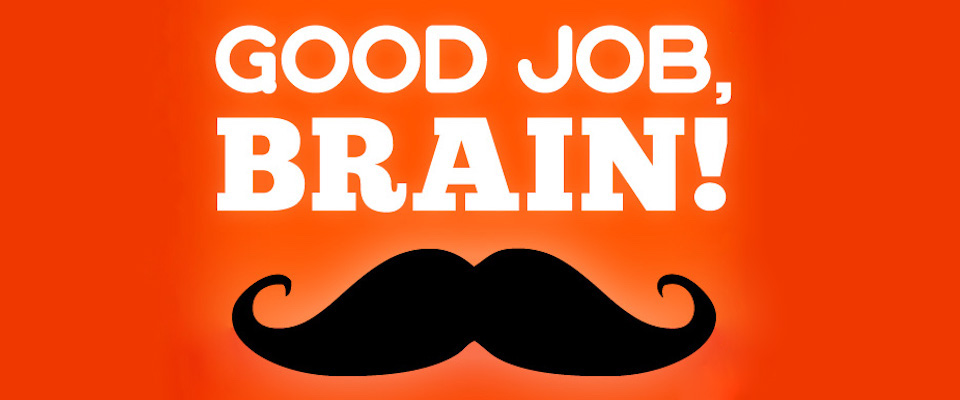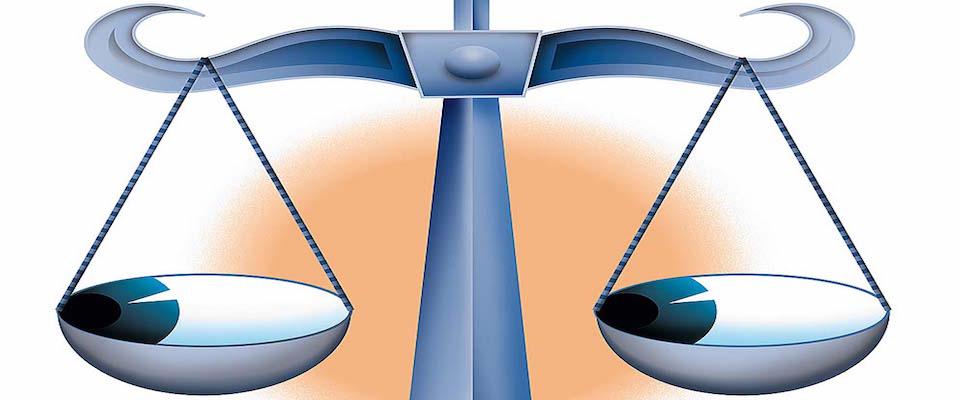What radio podcast has three words, one exclamation point, mines the game Trivial Pursuit for questions, and has been produced by three UC Berkeley alums and their pal for the past four years? It’s Good Job, Brain! But if you’re a trivia buff you probably already knew that.
Cal grads Karen Chu, Dana Nelson, and Colin Felton, along with Wired games editor Chris Kohler—produce the popular GJB!, which offers up Trivial Pursuit questions read aloud and discussions on esoterica of all kinds. Their new book, Good, Job Brain! Trivia, Quizzes and More Fun—was just released this week, and features workbook-style trivia with quiz/activity titles like “William Fake-Speare” and “What Would Keanu Do?”
They’re all avid pub trivia players, with Chu contributing her expertise on topics like hip-hop and dog breeds. Chu says, “The idea of having some cool podcast that’s trivia related… it was always in my brain, and I just never had time to flesh it out.”

But a career misfortune turned into just the right stimulus. “At the end of 2011, I was working for [SF-based] Game Pro magazine, and it shut down,” says Chu, who studied architecture at Cal and currently is at the live-streaming video platform Twitch. “I had all this time. I thought, ‘No, I’m gonna try to flesh this thing out.’”
Chu recruited her loyal trivia buddies, and approached her new project with the careful planning and consideration of a designer. The new hole in her schedule helped.
“I had time to realize a vision for what it could be and work my way towards that. I’d been on podcasts before, but was just a guest sitting there talking. I’d never done audio recording or editing,” says Chu.
The team discussed what feel and look they wanted to project to new trivia friends on the Internet.
“We needed a brand,” says Chu. “How does this make people feel? What’s the voice? I wanted to make something I wanted to listen to that’s not out in the market yet.”

With the input of Colin, who had been an art history major and freelance graphic designer, they decided on a distinctive orange color and typography for their website. Listening to the podcast would be like hanging out at a friend’s house, chatting and playing trivia, instead of a didactic lecture.
“My goal was to have people listen and for it to become widespread. All of us are nerdy and geeky in a way,” says Chu. “Now that we’re adults, it’s fun to be true to ourselves. We thought, ‘We can’t be the only ones.’ We would go to trivia every week and see all these other people that were playing.”
But what about recording gear? Chu, an early adopter of Kickstarter, used the platform to fund her new technological needs. “I did the math—here’s the equipment I need. We only had 100 backers, but we hit our goal.” Chu found out that she had gotten funded (Kickstarter doesn’t release money to fundraisers until the goal is met) while taking a bathroom break during the Disney World Marathon Weekend.
“I checked my email while I peed and I was like, ‘YEAAAH!’ I remember that moment very well,” she says, laughing.

Even though Kohler had been on Wired’s video game podcast, and Chu had guested on the World of Warcraft podcast—the team had to learn how to use all their new equipment as producers. Chu functioned as showrunner, handling production and editing, and each member of the team helped with trivia research. The first episode of Good Job, Brain! aired on March 1, 2012. “Thanks to a lot of the initial vision to create the brand, we shot up on the podcast charts,” says Chu.
Awards soon followed; Good Job, Brain! won Stitcher’s 2013 “Best Games + Hobbies” contest and The Guardian named it one of the Top 10 US podcasts for road trip listening in 2013.
Would they make any money? Chu says: “I knew revenue might happen. In the first year we were getting hit up by advertisers. For months I kept saying no. I wanted to wait until we were at a steady state where we felt comfortable with it. I didn’t want to have another thing I didn’t know how to do.”

Online men’s clothing company Bonobos was GJB!’s first advertiser. Now, their podcast host provider handles ad buys.
Given the team’s hefty non-trivia responsibilities, it’s a wonder that GJB! gets produced so regularly. Chu is constantly flying to other states on weekends to complete her goal of running a marathon or half-marathon in every state (“It’s like Pokemon, catch them all!” she says, a gamer to the core). Nelson spends time with her fiancé, who lives in Sweden. Podcasts recorded at Kohler’s house need to be edited to remove baby cries. And they still manage to play pub trivia, at Soma StrEat Food Park in San Francisco.
With no professional studio, the podcast recording work bounces around their respective homes. Chu recently moved from Berkeley to San Francisco. Nelson, a sociology major turned indie game developer, lives in Concord. Many episodes were produced in Felton’s apartment.
“What was hard about doing a podcast early on was the amount of preparation and moderating the time,” says Chu. “This is too short, how long is this taking. Now it’s been so long that we’ve been doing it, I don’t even need to look at a clock.”
“It seems like we’re professional, but it’s not that hard or complicated. I have a USB mixer. It has four mic inputs,” making it hard to have guests on the show, she adds. “We have mic stands and karaoke-bar mics. What makes all the difference in the world is a pop filter,” Chu says, which is a microphone filter that softens the percussive sound of the human voice saying letters like P. “You can make your own with pantyhose stretched across a cross-stitch frame.”

Now, the four are comfortably riding a trend; trivia is cool. “Trivia’s had a giant boom, thanks to apps like TriviaCrack,” she says. There are a number of podcasts, she adds, and “they are all good in their own right.” She differentiates other podcasts like WWDT or Trivia Warfare as being more about competition.
They have a bona fide fan club, and a few organized events have been full of enthusiastic listeners. “We did a fan meet-and-greet in Vegas,” Chu says. “We had some ad money, so I treated everyone to a trip. We had a fan meetup in New York and that was amazing, and another fan meetup in SF. Mostly it was just to hang out and talk to people and play trivia.”
Their official show was in San Francisco. “We had to formulate what a live show with an audience would look like,” says Chu. “The second half was interactive audience games. We had food during intermission. We made fake movie trivia slides for before the show started.”
Chu says the secret to the team’s success is simple. “Our chemistry is so good. It’s super awesome.”




















